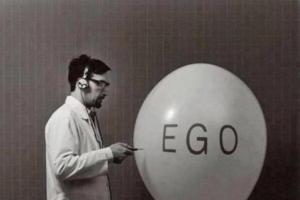Characterizing your own personality is quite difficult. When characterizing your character, it is important to remain objective: to the extent of narcissism and self-criticism. The main thing is that there is no exaggeration or understatement of your qualities, otherwise there will be a considerable amount of error in your self-analysis. Every possible effort should be made to look at yourself from the outside. Close people can also help here - friends or relatives who have known you for several years.
Determine your attitude towards work. This way you will understand not only whether you are hardworking or lazy, but also how diligent, responsible, and painstaking you are. Look at how you treat other people's work. All this will help create your professional portrait from the point of view of the need for labor in general.
How do you feel about things? Look at the objects that surround you. Are you thrifty? Are they petty? Do you value gifts? Or are you a supporter of minimalism and asceticism? In general, the objects on which your life and comfortable environment are built will help determine some basic character traits.
Why is the question “why” so important?
When describing your inner world, pay attention to typical situations in your life. Remember the moments that irritate you. Think about it, why is this so? Look at what you like most: what landscapes, weather, mood, people and various little things in them - voice timbre, hairstyle, smile, manicure and so on. Always ask yourself "why?" What makes you angry, what, on the contrary, touches you. It is important to think about your attitude towards the opposite sex.
Study your preferences in music, literature, painting, describe your interests. By the way, they explain a lot about a person. And one more thing: tell me who your friend is, and I will tell you who you are. Look at the people you consider friends. Perhaps they will be the mirror of your soul?
Self-examination is not for you?
If soul-searching turns out to be beyond your strength, endless thoughts are driving you into depression because you cannot find an explanation for certain traits, try using special resources. Literature on psychology or a regular application with personality tests is something that will help you at least partially sort out your character. Tests can be very different, so you can look at one character through the prism of, for example, archetypes, socionic types, even heroes of your favorite works or films! There are many models, but they are not a panacea.
Content
A well-written resume is the result of a successful job search. Many people don’t know what to write about personal qualities, how to use this to stand out among applicants, and show their best side to potential employers. The resume must include both valuable personal qualities.
Positive qualities for a resume
When showing strengths, highlight and describe 5-7 characteristics that clearly reflect your character. When choosing suitable ones from the list, it is important not to overestimate or underestimate your self-esteem. Evaluate your candidacy wisely and determine what character traits are needed for a particular position:
- activity;
- Analytical mind;
- ambition;
- quick adaptation to changes;
- attentiveness;
- politeness;
- discipline;
- friendliness;
- initiative;
- communication skills;
- reliability;
- goal orientation;
- optimism;
- responsiveness;
- decency;
- punctuality;
- independence;
- ability to make quick decisions;
- stress resistance;
- desire for self-improvement and development;
- creative approach to assigned tasks;
- ability to get along with a team;
- ability to persuade;
- determination;
- honesty.
Negative qualities
All people have flaws, and if you openly show your weaknesses to an employer, he will understand that you adequately assess your character.
Some negative qualities may be ideal for one type of work and categorically interfere with another activity.
The ability to recognize your own negative character traits is always valued by an employer.
Honestly select a few characteristics from the list below:
- trust only confirmed facts;
- trusting people, naivety;
- excessive demands on oneself and others;
- isolation, desire for solitude;
- slowness;
- inability to perform monotonous work;
- non-standard approach to problem solving, creativity;
- lack of skills and experience in certain activities;
- pedantry, scrupulousness;
- increased sense of responsibility;
- straightforwardness;
- self-confidence;
- modesty;
- excessive activity.

Examples of personal qualities in a resume
Personal characteristics of an individual are conventionally divided into groups and areas, which are applied depending on the position and vacancy. This:
- Attitude to work, business qualities. Personal characteristics for:
- integrity;
- initiative;
- interest in studying the intricacies of the profession;
- diligence;
- creativity;
- persistence;
- responsible attitude to assignments;
- hard work;
- perseverance.
- Attitude towards people. Personal qualities for a resume:
- politeness;
- flexibility in communication;
- goodwill;
- friendliness;
- communication skills;
- responsiveness;
- the ability to quickly find a way out of stressful situations;
- ability to persuade;
- justice;
- tolerance, respectful attitude towards people;
- ability to work in a team;
- clear diction, competent speech.
- Characteristics, attitude towards oneself. Personal characteristics for a resume:
- active;
- attentive;
- disciplined;
- cheerful;
- decent;
- punctual;
- punctual;
- self-critical;
- stress-resistant;
- confident;
- plodding;
- honest.
- Attitude towards your own and work things. Personal qualities of a person:
- careful;
- I always maintain order in the workplace;
- neat;
- neat.
Depending on the position for which the future employee is applying, suitable character traits are indicated. For example, the following qualities are suitable for an analyst or economist:
- pedantry;
- attentiveness;
- perseverance;
- responsibility;
- accuracy;
- diligence.

On an engineer's resume
In addition to professional skills, knowledge and abilities, indicate several personal advantages from the list:
- attentive;
- disciplined;
- results-oriented;
- responsible;
- self-organized;
- independent;
- ability to concentrate;
- technical mindset;
- balanced;
- plodding;
- purposeful.
Strengths in a lawyer's resume
This profession is associated with advocating for people's interests and helping to solve problems, so applicants must meet strict requirements. List of suitable qualities:
- attentive attention to detail;
- friendly attitude towards people;
- logical thinking;
- defending a certain point of view;
- the ability to quickly win over your interlocutor;
- the ability to consciously conduct dialogue;
- justice;
- desire for development;
- self confidence;
- ability to find a way out of difficult situations;
- the ability to clearly convey your point of view;
- resistance to conflict situations.

In an accountant's resume
An applicant for this position must have financial literacy and be able to manage company money. Select several personal, appropriate options from the list:
- careful;
- attentive to detail;
- executive;
- loyal;
- non-conflict;
- responsible;
- organized;
- punctual;
- scrupulous;
- capable of learning;
- stress-resistant;
- plodding;
- vigorous.
Sales Manager
In order to get this job you must have the following personal qualities:
- adequate self-esteem;
- politeness;
- high responsibility;
- competent speech, clear diction;
- initiative;
- communication skills;
- loyalty;
- multitasking;
- non-standard approach to solving assigned problems;
- sociability;
- result orientation;
- positive thinking;
- presentable appearance;
- punctuality;
- ability to learn and remember large amounts of information;
- stress resistance;
- hard work;
- self confidence;

For a manager's resume
To obtain a leadership position, you must highlight the following qualities:
- quick analysis;
- building communications;
- flexibility of thinking;
- interest;
- multitasking;
- observation;
- persistence;
- organizational skills;
- focus on obtaining the desired result;
- entrepreneurial skills;
- demandingness;
- the ability to inspire and lead;
- energy;
- independent decision making.
Positive qualities for a driver
Key personal qualities of the candidate:
- polite;
- attentive to the details;
- flexible in communication;
- communicable;
- loyal;
- responsible;
- decent;
- prudent;
- punctual;
- stress-resistant;
- tolerant.

Administrator
An energetic character is suitable for this position. Employers pay attention to applicants who have the following advantages:
- quick adaptation in non-standard situations;
- high performance;
- competent speech;
- bringing to fruition;
- love of life;
- initiative;
- communication skills;
- learning ability;
- organization;
- responsibility;
- positive attitude;
- stress resistance;
- ability to work in a team;
- determination.
Seller
For this position, employers value applicants with the following characteristics:
- ambitious;
- polite;
- diplomatic;
- having a presentable appearance;
- initiative;
- having the ability to listen and hear;
- communicative;
- team-oriented;
- responsible;
- positive attitude;
- independent;
- seeking professional and personal development;
- stress-resistant;
- patient;
- hardworking;
- confident;
- purposeful;
- vigorous.

Common mistakes
When compiling a list of positive and negative qualities in your resume, be extremely careful. The choice of characteristics is determined by the desired position and the internal culture of the company.
It is important that these personality traits are perceived in a positive aspect, and not as shortcomings.
For example, for an accountant, leadership abilities and charisma are undesirable, and in a creative team, pedantry and modesty will be a “minus”.
To avoid mistakes in describing personal qualities in the questionnaire, follow:
- Don't just use template phrases. Convey in your own words, in a discreet manner, your personal character traits. Exclusively for creative professions, you can use humor and creativity in your resume.
- Do not indicate more than 5 characteristics. Try to avoid vague, general phrases, for example, talented, responsible. It’s better to choose an individual character trait that exactly suits you and the desired position.
- Draw the employer's attention to personal qualities that are easy to immediately check, for example, energetic, sociable.
- When characterizing negative qualities, you should not evade the answer. It’s better to name several options and indicate how you are working on them, how you are improving your character.
Video
Found an error in the text? Select it, press Ctrl + Enter and we will fix everything!Getting to know each other is an obligatory stage of communication with people around you. Of course, it is easier to contact old friends: these people are aware of your character, habits and other individual characteristics. And the new ones have to tell everything again. It’s also good if we are talking about a casual conversation in the company of friends! But you often have to talk about yourself in writing, sometimes even in official documents. All kinds of profiles, resumes, accounts and interest clubs can’t wait for you to tell them information about yourself. For some, this is a mere formality, limited to a couple of standard sentences. But it happens that a lot depends on your description. In this case, you need to write about yourself not only honestly and competently, but also as interestingly as possible, so that your story does not get lost among other similar autobiographies.
Telling a story about yourself, whether spoken or written, is not easy for everyone. There are people for whom self-presentation is a habitual and even pleasant thing; they willingly share facts from their biography and present them in an exciting way, like a literary work. But for most, the need to write about themselves, and even in a special, non-standard style, is a serious test of their natural shyness, creative imagination, and simply their writing talent. For such people, we have prepared a kind of “cheat sheet” with hints and small tips on how to start, build and design your work, so that readers would be interested in reading about you even if no outstanding events occurred in your life, the description of which can become the basis of an adventure novel. In fact, everything is much simpler: even the biography of an average person who leads the calmest and most peaceful life can be read avidly if it is written in an interesting way.
Telling a story about yourself: rules, nuances and tips
An interesting feature of autobiography as a genre is that the same person can have any number of descriptions of his life. Moreover, life also remains one, and all the events that happened in it are true. But, depending on the style, purpose, and writing conditions, these works turn out completely different. As in any text, while maintaining one plot, an almost infinite number of plot development options are possible, where the narrative will be chronologically sequential or artistically distorted, logically correct or creatively adapted. As they say, there is a time and place for everything, and an autobiography when applying for a job has little in common with self-presentation when applying to a theater school. The only factor that unites them is you, or rather, the actual events of your life. Therefore, let’s first determine why and for what purpose you needed to write about yourself. The most common options are:
- When applying for a job, study or service. This is the shortest, essentially formal and therefore simplest option. It is not difficult to cope with it even without special tips, especially since in such cases the autobiography, as a rule, is written according to, right down to filling out the fields of the questionnaire. But even if you have a blank sheet of paper in front of you, you are only required to present in chronological order basic information about the time and place of your birth, education received, professional experience and, briefly, marital status. Formal autobiographies do not require more. An exception may be biographies of representatives of creative professions: journalists, copywriters, editors. They are more demanding in terms of vocabulary used and possibly examples of work. But a portfolio is a separate task and it is also formed according to its own standards, independent of the autobiography.
- When joining a thematic organization/club/section More detailed information about the candidate may be required. Depending on the direction of the establishment, include the relevant data in the list. For example, tell us about the sports awards, diplomas, medals and certificates won for participation and victories in Olympiads, intellectual games and competitions. If we are talking about a creative workshop, then it would not be amiss to talk about your preferences and tastes, favorite genres and techniques, idols and role models. The task of your life story in this case is to reveal your own character to people who still don’t know anything about you, and to join their formed team. Therefore, the more friendly and open your written story is, the more likely it will resonate and you are more likely to receive an invitation to an in-person oral interview.
- When registering on a social network/dating site There are not and cannot be any hard and fast rules. But there are certain techniques that can be used to make your story about yourself interesting and attractive to other users. For example, many representatives of the fair sex use poems, lyrics of their favorite songs or quotes from literary works for this purpose, which, in their opinion, correspond to their character and worldview. This tactic should be considered quite ingenious, because, in the absence of confidence in your own literary talent, you can take advantage of the win-win creation of a recognized genius. One way or another, your task is to create the image you need in the eyes of strangers, and even invisible to you, people. And for this it is not at all necessary to adhere to documentary accuracy. Allow yourself a little invention, complete your own image in your imagination so that you like it - then others whose tastes coincide with yours will also like it. But don’t get carried away with fantasizing - you are still writing about yourself, and not creating a fictitious image of an ideal, but, alas, non-existent person.
- When creating your own blog and/or literary work It’s interesting to write about yourself, it’s easy and difficult at the same time. On the one hand, for a professional writer, telling a story about yourself is not even work, but a pleasant relaxation bordering on subtle intellectual pleasure. And, since you have dared to become the independent “parent” of an entire book or mass media (and a blog can easily be equated to an information publication), then writing an original and fascinating autobiography should not be a problem for you. On the other hand, it is self-narrative that takes many professionals by surprise. Because it’s one thing to analyze and present information within the framework of a well-studied and interesting topic. And it’s quite another thing to reveal yourself to readers as a person, to demonstrate to them not only your fundamental knowledge, erudition and talent, but also the traits characteristic of mere mortals, sometimes far from the qualities of an ideal creator. Plus, not all creative individuals are the same in their desire to speak publicly. And for writers, unlike actors and musicians, this causes many internal barriers: embarrassment, fear of excessive frankness, etc. In this case, it is advisable to call on your sense of humor to help. A successful joke can disguise unsightly facts and even turn them into advantages, or it can simply fill a pause or fill the content with unexpected meaning.
Medieval philosophers, travelers and even skilled craftsmen described their lives for students and descendants. The genre of autobiography then gained such popularity that it even became an independent literary movement, the classic and witty parody example of which remains, for example, “The Adventures of Baron Munchausen” by Rudolf Raspe. It is difficult to remember at least one writer who did not publish a description of his own life in his books. It was possible to find out a lot of details about even the most mysterious personalities through their personal diaries and correspondence. By the way, the epistolary genre is an inexhaustible source of inspiration when writing a story about yourself. After all, people try to be sincere in letters and trust the recipients with a lot of secret things. This can serve as a good school and a storehouse of ideas for you. Therefore, do not be lazy to read the biographies of famous people, feel free to borrow interesting techniques and speech patterns from them.
An example of an interesting story about yourself
So, we have dealt with the theoretical aspect of writing a story about ourselves, it’s time to move on to practice. Because no one but you will write a biography about you in such a way as to reveal to readers all the facets of your character and bright individuality. Don’t forget that the most difficult thing is to start, to overcome the resistance of a blank sheet of paper. And then, word by word, the story will flow by itself if you allow yourself to surrender to creativity. You can gain such emancipation gradually; to do this, start with something simple: first write a formal autobiography, then expand it with introductory phrases and artistic vocabulary, and then completely color it with beautiful images and literary devices. Moreover, save each next option separately, it will be useful to you in the appropriate situation. This way, you will receive the blanks of several stories about yourself at once and will be able to use and modify them as necessary.
Example of a formal autobiography:
“I, Ivanov Ivan Ivanovich, was born on June 13, 1980 in Kiev. In 1987, he was admitted to the first class of secondary school No. 13, from which he graduated in 1997 with honors. In the same year he entered the Kiev National University. T.G. Shevchenko to the Faculty of Philosophy, majoring in Political Science. During his studies at the university, he completed full training in the reserve officer training program and received the rank of junior lieutenant. He graduated from the university in 2002 with a degree in political science. Immediately after completing his studies, he began working in a news agency as an analyst and consultant to the editor-in-chief. In 2008, I took the position of editor of the politics department, which I hold to this day.
I am married and have a 7-year-old son and a 2-year-old daughter. Wife, Anna Valentinovna Ivanova, born in 1986, a journalist by training, works for a monthly publication. I am interested in photography and painting, and love to travel. I lead a healthy lifestyle, regularly go to the gym and ride a bike. I don’t have any bad habits; I prefer to spend my free time from work with my family and on active recreation.”
Now let’s imagine that this person, already a little familiar to us, decided to join the ranks of the club of travel photojournalists. The club is virtual, the main communication between its participants takes place on its own forum on the Internet. And now our friend will have to register and greet the old-timers of the club, at the same time explaining to them who he is, why and why he came to the forum. The text of the story about yourself in that case will differ significantly from the one given above. It could be, for example, like this:
An example of an interesting autobiography:
“Dear friends, allow me to introduce myself! My name may seem funny to you at first glance, but believe me: it is real. That’s exactly what my parents named me, thanks to their sense of humor, and that’s what it says in my passport - and this, by the way, is an official document! In general, my name is Vanya, my last name is Ivanov. You can start making fun. But it will be even easier to remember me this way J
I have been interested in photography for quite a long time, for about seven years now. But, unfortunately, I only recently learned about your community. I really hope that you don’t have hazing and that newcomers are not barred from entering the club. Because your work and accumulated experience interested me extremely. I had the courage to look through the photo gallery presented on the site, and I am ready to take off my hat to the authors of these photographs. The accuracy of the reporting, the quality of the photographs, and the artistic flair of the photographers are very impressive. For my part, I promise that I will make every effort to meet this high level and adequately present my creativity.
As for me personally, I am a very ordinary person and practically not outstanding in anything. I make a living doing what I love most and what I know best: building hypotheses and making forecasts about the political situation in our country and beyond. It’s a troublesome and thankless task, but someone has to do it. But at home, waiting for me is an almost adult son, a first-grader, a sweet daughter, and, of course, my beloved and only wife, Anya. All three of them, by the way, also know a lot about travel and beautiful photographs.
In general, if I have not yet tired you too much with my biography and can be at least somehow useful to the respected community, then I will be very glad to be accepted into its ranks. I promise to be disciplined, polite and obediently follow all the rules of the club. A special greeting to all Kiev residents and an invitation to Sunday bike rides. To everyone else - just my immense affection and best wishes J"
Do you feel the difference between the first and second text? It is completely justified and caused by the specifics of communication and the purpose of the story about oneself. Analysis of the features of the given texts will help you understand the nuances of presenting information and in the future can be used by you when writing your own biography:
- In both cases, the author did not sin against the truth and provided truthful information about himself. But in the second story, he deliberately omitted those facts that were not relevant to the case. But I included in the first paragraphs what might be of interest directly to this group of readers. A very correct tactic from the point of view of self-presentation - it takes into account the interests and characteristics of the audience’s perception.
- The same goes for presentation style and vocabulary. In the first case, it is dry and official, as required by the documents. In the second, it is replete with colloquial expressions, figurative expressions and other means of language that are unacceptable in business correspondence. But for a group of friends with similar interests, this language will be the most understandable and pleasant.
- Unlike the first, strictly text, in the second story the author makes full use of humor and personal charm, expressed through language. He verbally paints before the readers the image of a kind of joker and an easy-going person who is endearing to himself. This is a great way to make talking about yourself interesting because it takes away the rough edges of writing with the ease of friendly chat.
- In the second story, the author constantly maintains contact with readers. Talking about himself, he managed not to focus on his beloved self, but to always address the audience. Use this technique to interest the reader, because every person enjoys being given special attention.
- The author even took into account the fact that his story about himself would be perceived not aurally, but visually, and on a platform intended for interactive communication. That is why he allowed himself to use graphic symbols that were unacceptable in printed correspondence or a handwritten note. You can do the same: if you need to write about yourself on the Internet, then feel free to use emoticons and Unicode characters. But use them sparingly, do not overload the text, because an excessive number of pictures irritates the reader.
An interview is a standard step during a job search. After all, after a suitable vacancy has been found, there will be a meeting with the employer, where you will have to personally prove to him your professional suitability. The most important thing here is to present yourself correctly, which means you need to compose a competent story about yourself. For examples of what to tell about yourself during a job interview, see below.
Don’t forget to ask your employer about your future job – ?
Most often, an interview with an employer consists of a series of standard questions. For example, this could be personal information where they will ask about place of residence, age and work experience. But the main part of the interview is self-presentation. And more often than not, this is the part that confuses most people. To successfully pass it, you should prepare in advance and write a sample text of a story about yourself.
What to tell about yourself at a job interview
Many people, before going to a meeting with an employer, hope to improvise on the spot. But it has been proven that even the most resourceful people often get lost when answering the most common questions. Therefore, it would be a good idea to write a short story about yourself while still at home.
When writing a story about yourself, it is worth remembering that brevity is the sister of talent. The overall story should be between two and four minutes long. Therefore, the written text must be carefully re-read loudly and out loud, with your usual diction. You need to talk about the most important facts in your biography so that the monologue turns out to be short, but free and meaningful.
It would be a good idea to find out some additional information that will be very helpful during the interview:
- Check out the company's website. There you can find out in what direction it works and what kind of employees it is looking for;
- Based on this data, make a list of personal qualities that may be useful while working in the desired position. For example, responsiveness, determination, self-discipline;
- If this is wholesale or retail sales, then you can talk about successful experience working with many clients;
- Mention achievements without embellishing them, but also without keeping silent. After all, they can play an important role during the selection of a candidate.
After collecting data, you can begin to compile a story about yourself. The main thing is to take into account that all remarks must be meaningful, but at the same time succinct and concise.
To hold attention, you should basically avoid saying “no” and any negative particles. You can include in your self-presentation:
- The name of the educational institution, not forgetting to mention its advantages and benefits. But at the same time, you should not list all places of study, starting with school. One is enough;
- It would not be amiss to mention the completion of special courses, knowledge of PCs and foreign languages, if any;
- Be sure to tell us about your experience. But most importantly, it is necessary to emphasize the achievements while working in previous companies.
5 examples of stories about yourself at an interview
Example 1:
My name is Maria Ivanovna (or Sviridova Maria Ivanovna). I am 25 years old. I live in Moscow. Single. In 2012 she graduated from the Faculty of Economics of the State University. After graduation, I worked in my profession. My work and study experience convinced me that this field is very close to me. Therefore, when I saw a vacancy for a marketing specialist in your company, I hurried to come for an interview. I think that this is where I can work in my profession with pleasure, because the prospects provide not only analytics, but also product promotion. This is exactly what has always fascinated me.
I have all the professional qualities for this position (they should be listed here). I speak English and am a fluent user of basic computer programs. I am easy to learn and have no conflicts. I am creative and always approach situations from a non-standard angle. This is what helped me prepare shares at my previous job, which subsequently brought several large clients to the company.
4 more examples of talking about yourself(click to enlarge text):
| Example 2: | Example 3: | Example 4: | Example 5: |
Often employers ask during an interview about a person's hobby, which can tell a lot about him. Under no circumstances should we remain silent about this question. Having a favorite activity will characterize you as a versatile and active person.
If a graduate is interviewing for a job, then you shouldn’t get lost here either. When asked about your experience, you can safely state your scientific activities at the university, talk about successes and achievements, which employers very often appreciate.
Thus, the outcome of each interview depends on personal preparation. With a detailed study of self-presentation, data collection and correct behavior during a personal conversation, you can easily interest the employer and get the desired position.
How to behave during an interview
To make a positive impression of yourself, you need to carefully consider not only what to say, but also how to behave during a job interview. There are some common tips from negotiation experts.
One of the most important components of a successful job search is a well-written resume. This small document is designed to distinguish the applicant from other applicants for the position and interest a potential employer. It is important not only to reliably indicate age, education and work experience, but also personal qualities in your resume. Real-life examples show that it is precisely this information that recruiters and managers have been seriously paying attention to recently. You can seek help from specialists or try to do it yourself.
Important nuances
Before choosing which personal qualities to include in your resume, examples and samples, you need to study and familiarize yourself with the basic rules for filling out this section.
- Any information must be reliable and truthful. The deception will sooner or later be revealed anyway, so you shouldn’t fool others or yourself by the nose.
- Personal qualities should be stated briefly and clearly. However, you should not use only hackneyed general phrases that do not convey any specific information to a potential employer.
- This section, like the entire resume as a whole, must be written correctly, without errors and colloquial vocabulary.
- As a rule, you are asked to indicate the five most important personal qualities, so there is no need to overdo it and indicate everything. It is necessary to carefully analyze which character traits or behaviors may be useful for a particular profession or position. For example, an economist does not necessarily need to be creative, but a salesperson will find it very useful to be able to resolve conflict situations.
Groups and Templates
Personal qualities for a resume can be divided into several groups, each of which has its own template phrases.
- Work and job responsibilities. These include: high efficiency and hard work, dedication or focus on results, analytical skills, determination, responsibility, ability to adapt, discipline.
- Relationships with people. Templates: sociability, friendliness, resistance to stress and non-conflict, ability to persuade, ability to work in a team, fairness, politeness, competent speech.
- Creative thinking and development. Possible options: easy learning, desire for development, desire to improve, creativity, creative approach, resourcefulness.
- Character traits. Typical expressions: perseverance, attentiveness, accuracy, activity, punctuality, decency, cheerfulness.

Personal qualities in a resume: examples of writing for some professions and positions
There are many template phrases that can be used when creating a questionnaire. The employer carefully examines the personal qualities in the resume.
Example of a manager:
- focus on the results of the entire team's work;
- ability to persuade and direct; availability of skills to quickly analyze the situation and make decisions;
- stress resistance;
- increased performance.
Accountant: attention to detail, scrupulousness when working with documents, the ability to easily learn and adapt when changing legal requirements, perseverance, decency.
Lawyer: literacy, ability to find, remember and analyze volumes of information, perseverance when working with documents, ability to quickly make decisions, contact.
Secretary: pleasant and well-groomed appearance, competent speech and good diction, ability to communicate, ability to smooth out conflict situations, efficiency, accuracy.
It is very important to correctly describe personal qualities for professions that involve working with people (managers, salespeople, consultants, etc.). You can use this sample to create a resume.
Personal qualities (example): sociability, ability to easily establish contact, ability to persuade, resistance to stress, non-conflict.

First job
If a resume is being compiled for the first time, and there is nothing to fill out in the column about work activity, then in the section on the specialist’s personal qualities it is better to indicate the following:
- desire to develop and improve;
- fast learner;
- good memory;
- activity;
- creativity and creative approach to work;
- desire to work in a team.
However, we should not forget about the relevance of qualities for a particular place of work.

Nobody is perfect
From the information presented in the previous paragraphs, it is clear how to write personal qualities in a resume. The examples given above will help you understand and fill out this section correctly. But what if the employer asks you to state your shortcomings?
Under no circumstances should this item be ignored or left blank. Because ideal people simply do not exist. A reluctance to point out your weaknesses may put a potential employer on guard. In this matter, it should be remembered that some negative character traits or behavioral characteristics are simply unacceptable for some professions, but for others they have no meaning or, on the contrary, can be very useful.
So, let's look at personal qualities in a resume: examples, weaknesses in a favorable light:
- Excessive scrupulousness or perfectionism. For a party organizer or animator, such a deficiency will most likely greatly interfere with their work. But such an accountant or financier will be just a godsend for a manager.
- Excessive activity. For professions that require perseverance (analysts, accountants, economists, accountants, seamstresses, telephone operators, etc.), this is a big drawback, but for those from whom “moved mountains” are expected (managers, salespeople, journalists, etc.) ), this negative quality is actually simply irreplaceable.
- Inability to deceive or be cunning. For a seller, most likely, such a disadvantage will be significant, but an assistant manager with such a weakness will suit a potential employer.
- Having bad habits. Today, many firms and enterprises refuse to employ people who lead an unhealthy lifestyle, but a person who smokes cigarettes will fit quite harmoniously into the position of sales manager at a tobacco company.
- Appearance. For example, being overweight can be a huge disadvantage for many professions, but for a customer service dispatcher or a telephone operator taking taxi orders, such a disadvantage does not matter at all, since no one will see it.

Resume for interview
When writing your characteristics, you should take into account the likelihood that during the interview the applicant will be asked to confirm what he wrote with specific actions. Therefore, it is worth seriously considering what personal qualities to include in your resume.
Example: a person applying for the position of an analyst wrote about his ability to quickly find any information. During an interview, he may be asked to do this to ensure that he has this skill in practice.
Or another example: an applicant for the position of sales manager, who easily finds an approach to people, may be asked to meet and get the phone number from the first person he meets.
Such checks are now very popular and are used in hiring processes in many large companies.








